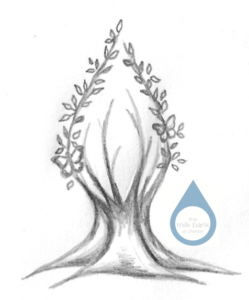Milk Donation After Loss
If you decide you would like to donate milk that you have previously expressed or would like to continue to express, there is lots of information below about the Milk Bank @ Chester’s Memory Milk Gift initiative.
Screening process
Our dedicated bereavement team are here to guide you through the screening process and are working closely with bereavement teams across the country to ensure that the process is as simple as possible. The first step is to contact us and we will talk you through the donor recruitment process and answer any questions you may have. Alternatively you can fill in the online screening form on this page if you would prefer.
We will ask you about any medication you have taken while expressing the milk, please be aware that sometimes we may be unable to send milk to hospitals if you have taken certain medication. In these circumstances we will offer you the choice to donate your milk to the milk bank for research purposes or to help us to ensure best practice. Examples of how your milk could be used can be found here.
The next stage is to complete our Donor Record Form which we will send by email. When we have received the completed form we will arrange to collect your milk at a convenient time and will discuss the most convenient way for you to have blood samples taken. All donors are tested for HIV 1-2, HTLV 1-2, Hepatitis and Syphilis, you will be informed of your results within approximately 2 weeks.
Continuing to express
Some families choose to continue to express milk following the loss of their baby. While this option does not suit everyone, some families find comfort in continuing to express and donate. We encourage families to discuss milk donation with the healthcare professionals who are caring for them to help make a decision that feels right for them. Your healthcare professional will also be able to give you advice about expressing, including how soon to start and how often to express.
How your milk will help
Donor milk is recommended for premature and vulnerable babies when their own mother’s milk is not available due to illness or while establishing their milk supply. Your milk will be issued to one of 70 different hospitals supplied by the the Milk Bank @ Chester.
Thank you for thinking of others at this difficult time, we hope you will find some small comfort in knowing your precious milk donation has helped vulnerable babies.
Memory Milk Gift
The Memory Milk Gift Initiative was created in summer 2021 to raise awareness of donation after loss as a choice for families. Our Memory Milk Tree is located in the Milk Bank and we are delighted to be able to offer our families who donate after loss the opportunity to have your baby’s name added to the tree. We also offer a wooden Memory Milk Pebble with your baby’s name on to remember their precious gift to others. These options are available at any time during your donation journey or afterwards – if you donated in the past before Memory Milk Gift was established we are able to offer these options to you.
We have dedicated social media channels for bereaved families, please let us know if you would like to share your baby’s story on one of our Instagram dedication squares. www.twitter.com/memorymilkgift and www.instagram.com/memorymilkgift
The following milk banks have also committed to the Memory Milk Gift mission statement:
“We believe that all bereaved families should be given the choice to donate milk in memory of their baby.”
- Milk Bank Scotland
- Birmingham Women’s and Children’s Hospital Milk Bank
- Calderdale and Huddersfield Donor Breast Milk Bank
- Cambridge Milk Bank
- Hearts Milk Bank (Hertfordshire)
- Oxford Milk Bank
- St George’s Hospital Milk Bank (London)
- Southampton Human Milk Bank
- Western Trust Milk Bank (Ireland)
To find contact details for these milk banks please visit UK Association for Milk Banking website
British Association of Perinatal Medicine Framework for Health Professionals
Framework for Practice: Lactation and loss | British Association of Perinatal Medicine (bapm.org)
This framework is written for professionals working with parents and families to provide information and guidance in supporting mothers around lactation and loss, where a baby or child is not expected to survive, or has died.
The aim of this framework is to review lactation and loss and to utilise this knowledge to guide support for mothers and parents to make the choices which best suit their individual circumstances. This includes options around both cessation and continuation of lactation following the death of a baby.


